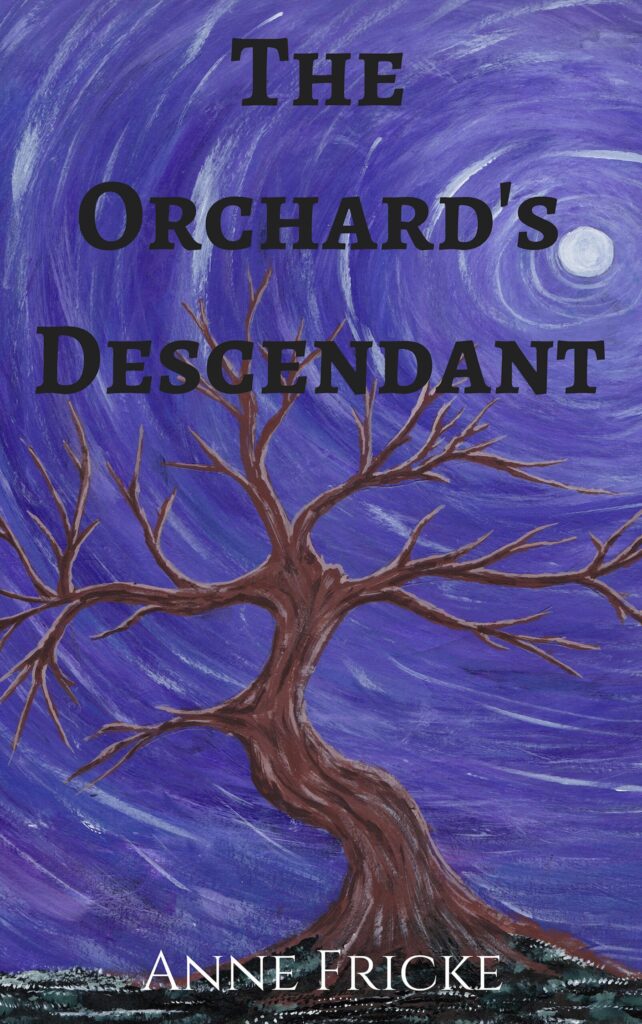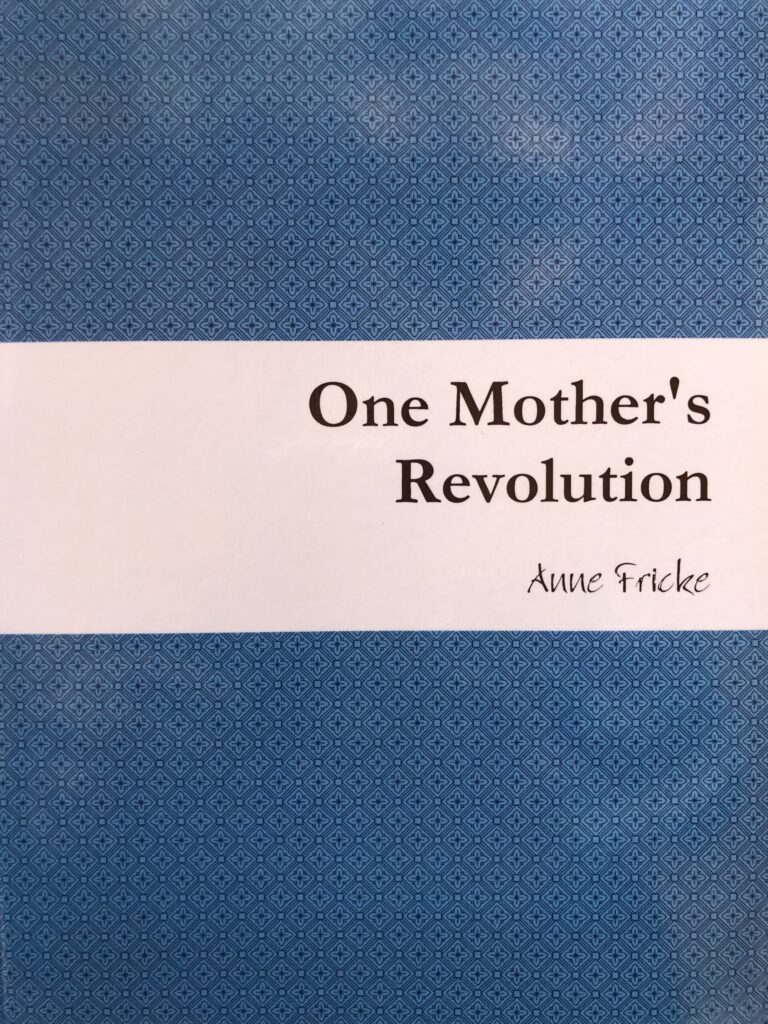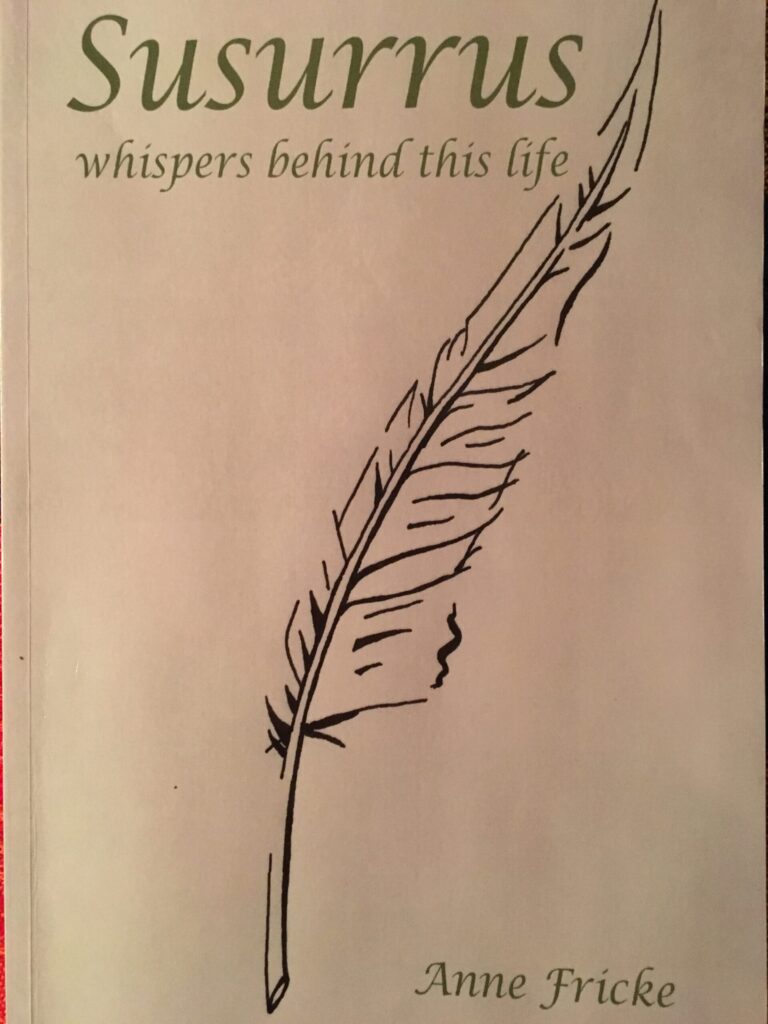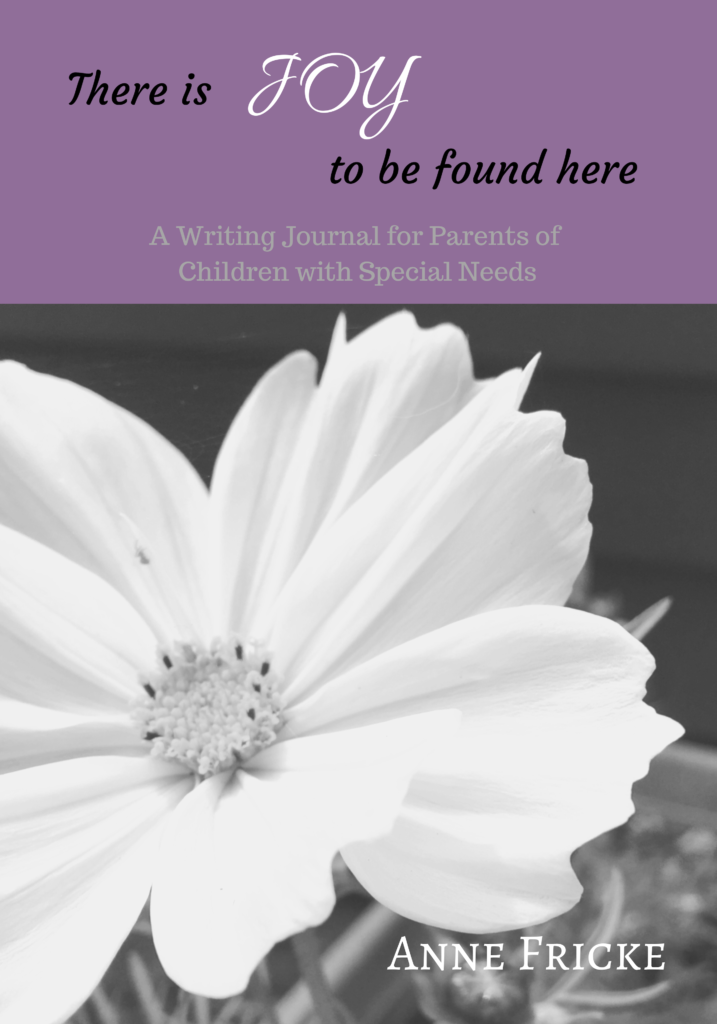
Author Interview: Anne Fricke
Anne Fricke is a poet, author, storyteller, podcast host, wife, mother, and aspiring campfire musician. She lives in far Northern California, writes daily, and travels when she can. She has published two collections of poetry, a novel titled The Orchard’s Descendant, a journal for parents of children with special needs, and was co-editor of a poetry collection on the theme of shelter-in-place. The Orchard’s Descendant is available in paperback and ebook through Amazon and as an audio book, read by the author, on Audible. More about her work can be found at annefricke.com.
Hi Anne, thank you for this interview. Would you like to tell us more about yourself?
I live in a small town in Northern California, by the ocean and near the redwoods. I grew up in the middle of the country and after almost 20 years here I am still in awe of the beauty and grandness of the landscape. My husband and I have three daughters, far too many dogs, and a few cats.
Along with being a novelist, I am a poet, both performance and written. Poetry is my first and true passion. After many rejections, I had decided to stop submitting my poems for others critique. Then some members of our local poetry community began to send me submission calls and encouraged me to put my poetry out there. I’m very happy I did because I have been receiving acceptances these last few months. It’s very satisfying and encouraging to have people in the poetry world recognize and appreciate what I’ve been writing.
One of my daughters has a rare genetic disorder, so I have become vocal in the special needs community. I host a podcast for the special needs community and have published a writing journal for parents and caregivers.
I love to garden and start projects like quilts and knitted hats (finishing them is another thing). I have recently taken up roller skating, inspired by the roller dance reels on Instagram. And though I would love to have more time to myself to write, and for my daughters to be with their friends and peers, I am grateful for the time we have had together during this pandemic.
Thank you for sharing such important aspects of your life. You wrote about the journey of a woman who decided to make a fresh start in her life and still, this new beginning brought various problems. Could you tell me more about how you managed to successfully convey the emotional state of the protagonist and how she grew into the person we read about in the end?
I appreciate that you think I was successful in conveying her emotional growth. Decisions around when or if to start a family are very complicated and do stir up a lot of strong, sometimes erratic, emotions. My family started unintentionally in a way. My husband and I found out we were pregnant not too long after meeting each other. Here we are, 17 years and three kids later. So far we’ve made it. But it’s been a lot of hard work and patience and love.
Maggie’s situation was different because her pregnancy was with someone she would never have ended up with. (Hopefully this is not a spoiler because it’s in the first few pages). The abortion was a key element to her emotional state, her desperation, indecision, and her growth. I am adamantly pro-choice and a vocal proponent for a woman’s right to control her body. While I have not personally experienced an abortion, I have helped friends who have had to make that decision. No matter how sensible it is to end a pregnancy, it is a difficult and emotionally trying experience.
So, I would say that I pulled from all of these experiences and feelings around starting a family and fed that indecision, vulnerability, and fear to Maggie. I could also relate with the feeling of needing to move on from the community you were raised in to have some new adventures. Maggie is certainly braver than I am though. Some of those situations with the barn and the house would have had me running away for good.

There is no doubt that many women can relate to the problems Maggie has to deal with in her life. So, what was the hardest scene you wrote in the book?
The first one that comes to mind is the scene of violence against a young Daniel. I hated writing that, but it was important to explain why he had to leave and his relationship with his father. I also had a hard time with the death of his mother. My struggle as a writer of fiction is that I want good things to happen to my characters. I don’t want them to suffer, but there’s not much of a story without suffering. Since I wrote in Daniel’s voice as well, I really got to know him. He had a lot of misfortune in life and sometimes it was painful to walk him through it.
True, life has not been easy for Daniel, but I’d like to think that his misfortunes made him a stronger person. What changed in your life, now that you are a published author?
I wish I could successfully convey a laugh through typing, a laugh at myself of course. I self-published and I suck at marketing and promoting. I don’t know that I even see myself as a published author, at least, not in the sense I think you are asking. One of the beauties of this age is that writers don’t have to wait for a publishing company to accept their work. The agents and publishing companies no longer get to be the deciding factor in what stories get told.
I had a story in my head, with characters that I wanted to get to know more. I spent years writing after my kids went to bed, or when I could escape to a coffee shop for a few hours. I would put this story away for months at a time when we traveled or life had more exciting adventures. But the story always called me back. The characters needed their conclusion. There are a lot of hours of writing, editing, and researching in this book. And thankfully, we live in a time when I could easily put this story out for the world to read.
I guess what has changed is a sense of completion and satisfaction for a story well-told. Not every one will agree, and they don’t have to. But I was able to tell this story the way it was meant to be told and offer it to others. For that I am grateful.
It is great that authors finally have the choice to publish their books without a publisher! Out of curiosity, was there anything that you edited out of the book and if so, could you give us some details on what it was?
There must be some scenes somewhere that didn’t make the cut, but I don’t remember anymore. I’d rather not for fear that I would grow attached and feel compelled to write them back in.
I completely understand. Do you find yourself being more inspired during the day or during the night?
Great question, and I find the answer evolving. For the majority of my life, I’ve been a night person, always the last one up. Once I had kids that became even more so. I used to say I needed at least 4 hours of awake time after my kids went to bed to feel like a person. So that is when I would write.
When I started getting more serious about this book, we had a babysitter come two days a week for 4 hours at a time so I could go sit in a coffee shop and write. During COVID, when the kids were home all the time, my writing started at 5:30am and lasted until they had to wake up for online classes.
Poetry comes when it comes, whether driving down the road, sitting ready with a pen and my journal, or waking me from sleep. Sometimes I am able to sit with it and flesh out the poem, other times it gets lost in the clutter and chaos of family and domestic responsibilities. Basically, I could write anytime. Different times of the day seem to produce different styles and outcomes.

Wow, I loved what you said about “Different times of the day seem to produce different styles and outcomes.” When did you first realized that you wanted to become an author?
At the risk of sounding cliché, I always wanted to be an author. I began writing poetry and stories almost as early as I learned to write. I wanted to write the ‘great American novel’ by 18. Ha!
I went into college as an English major but eventually grew bored and decided I could be a writer without the degree. Now I wish I had a few more English classes under my belt. I switched to Anthropology, way more exciting, and my career expectations switched along with it. Life gets distracting at times. I have a few hundreds pages of a novel I started to write when my oldest was a toddler. Sometimes I think about refurbishing those pages and putting them out there.
Why not? Revisiting a manuscript, you wrote years ago, can be a very exciting experience. What is your favorite genre?
Historical Fiction told from a woman’s perspective, hands down. During my first pregnancy I read, The Mists of Avalon series (some would probably call this fantasy). When my daughter was born, I was reading The Moon Under Her Feet and The Red Tent. These are all books that take stories from our past, moments and people most of us have heard about as told through the lens of a male-dominated history and give the women in the story a voice.
They sound so interesting! I am curious to know how do you select the names of your characters?
One of my least favorite parts of writing fiction is coming up with a name. Maggie was originally Lila in The Orchard’s Descendant. Then my daughter became good friends with a girl named Lila and it felt weird to me to continue. That was a tedious task, going back through and changing all of the names.
For some reason I can’t think of Maggie as Lila. Would you like to plan your book before you start writing or start and see where the story goes as you write it?
There is a balance. Like I said previously, I have a few hundred pages of a novel that I’m not sure will ever be workable. I never created an outline or a clear vision of how the story was going to be told. I knew the beginning and the ending and every night I would sit down with a glass of wine and write. There was a lot of inspired writing there, but it branched off in so many directions that I eventually gave up.
With The Orchard’s Descendant, I had learned to start with an outline. The story that came out is not necessarily the story I began with, but the bones are there (pun intended). Parts of the book are included because they had to be for the sake of story structure. Those were sometimes the most difficult scenes to write. Other aspects of the story came out as I was writing them (sometimes I had no idea what would happen next until I wrote it). With these I was forced to adjust the plot around them.
I write short stories and novellas as well (some under a pen name). Sometimes they start with an inspired paragraph or a scene, and sometimes with just the idea. I try not to get too far though without at least a rough outline of where the story is going.

That was very helpful! Do you believe that reading books is important for someone who wishes to become an author?
If you would like to write to a certain audience, then yes.
Years ago, I would have said no, that inspiration and talent are enough to become an author. I still like to believe that, and it’s true for some people, and probably certain genres. But the more into this world of writing and publishing I get, and probably the older and more cynical, I think it is important to read books, especially in the genre you intend to write.
One of the things I’ve learned is the importance of knowing the genre you are writing in. When readers pick up a book in the mystery section, there are certain aspects and elements they expect. Now, maybe you don’t need to have read a ton of mystery books, but you should at least be familiar with the elements that are expected. Otherwise, it’s a disservice to the reader, and possibly false advertising.
Being a reader shows a passion for story, I think the best writers are those who have voracity for stories, whether being told to them or by them. Reading can inspire more story ideas and that passion for a story well told.
Would your younger self be surprised to know that in the future you’d be a successful author?
Again, this question makes me chuckle at myself. I would not call myself a successful author, but a satisfied author. The majority of people who have read The Orchard’s Descendant seem to genuinely enjoy it. I don’t know that my younger self would be surprised because it was something that I always wanted.
I certainly did enjoy reading it and I am curious, aside from the novel you mentioned, you have any other unpublished or unfinished books?
Yes to unfinished novels and stories and works in progress. I have a few published poetry collections but am very excited for the one I am working on. I’ve taken my adoration of historical fiction as told through women’s voices and applied it to poetry.
I have poems written about Mary of Magdala, Boudiccea, St. Brigid, and more. These poems are a way to speak to these women, or have them speak through the poem, to give a different or deeper perspective on what history has told us about them. Some of the poems have been published in a blog entitled Feminism and Religion (not my blog but one that I have been reading and appreciating for years).
There are many more to write still until it’s publishable, but it’s my newest passion, and perhaps the most involved. For a one-page poem written from the perspective of St. Brigid speaking to the Goddess Brigid, probably 5 hours of research. It’s incredibly satisfying and inspiring work though.

Congratulations for writing such interesting poems about female historical figures. It is truly inspiring. So, writing is something that energizes you?
Again, at the risk of sounding cliché, writing is something I have to do. It energizes me, yes. It de-clutters my thoughts and helps me get clear on whatever emotions I’m dealing with. It’s my therapy.
I mentioned that I have a daughter with a rare genetic disorder, Prader-Willi Syndrome. The journey can be overwhelming at times and writing has been crucial to my growth and understanding as a mom. In honor of this and the many wonderful parents I have interviewed on my podcast, I have published a writing journal for parents of children with special needs. The writing journal, There Is Joy To Be Found Here, is a book of writing prompts and inspirational quotes to help parents write about their own experiences and journeys. The intention is that through writing they find clarity, solutions if needed, acceptance, and the joy that can come with all of this.
When the pandemic began and Americans were buying up toilet paper, I bought journals and pens.
Again, congratulations on your very important work. Your dedication sets a perfect example for everyone. How long do you spend researching before you start a book?
The Orchard’s Descendant is set in a fictional version of where I live, so I didn’t have to research when I began. The bulk of the research I had to do was about America’s involvement in the Korean War. When I began writing I had no idea that would be a part of the story, so it happened as I went along. I had done quite a bit of research on fruit tree grafting, thinking there would be more details about that in the book, but it turned out I didn’t need so much.
What would your advice be to aspiring writers?
My younger, rebellious self would tell aspiring writers to just go out and live a fun life and write when you’re inspired. The first part of the advice still applies. However, I now have a much better appreciation for the craft of writing. I have heard it said that writing is a muscle that needs to be worked, and I agree. Write every day to strengthen that muscle and flush out ideas. Take writing classes and workshops to help hone your skills. If you want to be published, that’s a whole other area that requires knowledge and research.
A few years ago, I went to the San Francisco Writers Conference. It was an incredibly eye-opening experience for me. I saw first-hand the publishing game and came away from that realizing I didn’t want to play it. I’m grateful I went and would suggest the same to others. There are conferences like this all over. I did get one of my favorite poems from the experience, I Found the Poets.
Thank you for sharing your experiences and I am certain your advice will help many authors. What do you have in store for us in the future?
I have considered pulling out that first novel I attempted. It needs a ton of work, but the bones of the story still call to me. I also have the outline of a second novel mostly set for when I can find a decent enough chunk of time to get started. And then there’s the poetry.
Thank you for your time, Anne, and I can’t wait to read more of your work.
